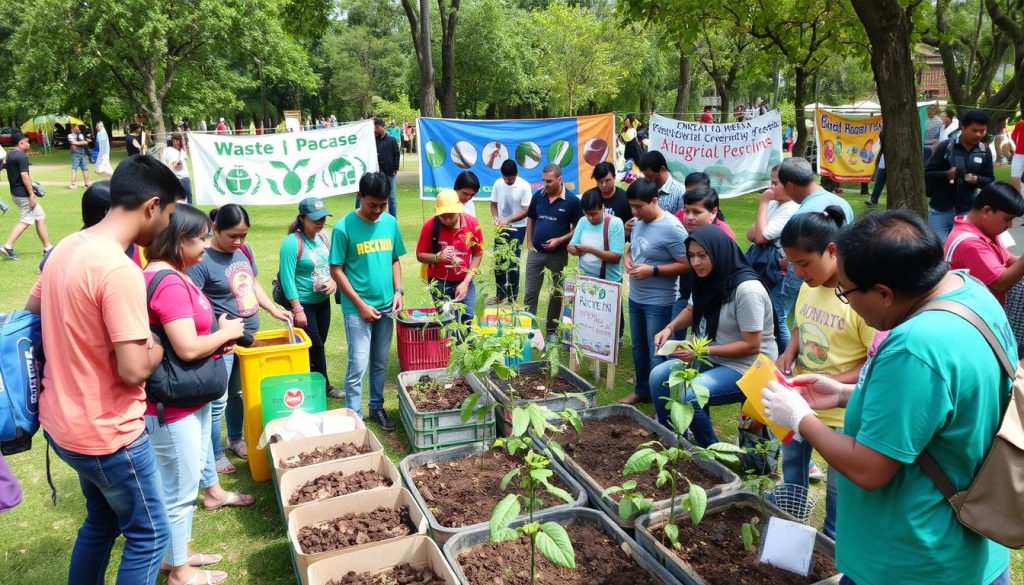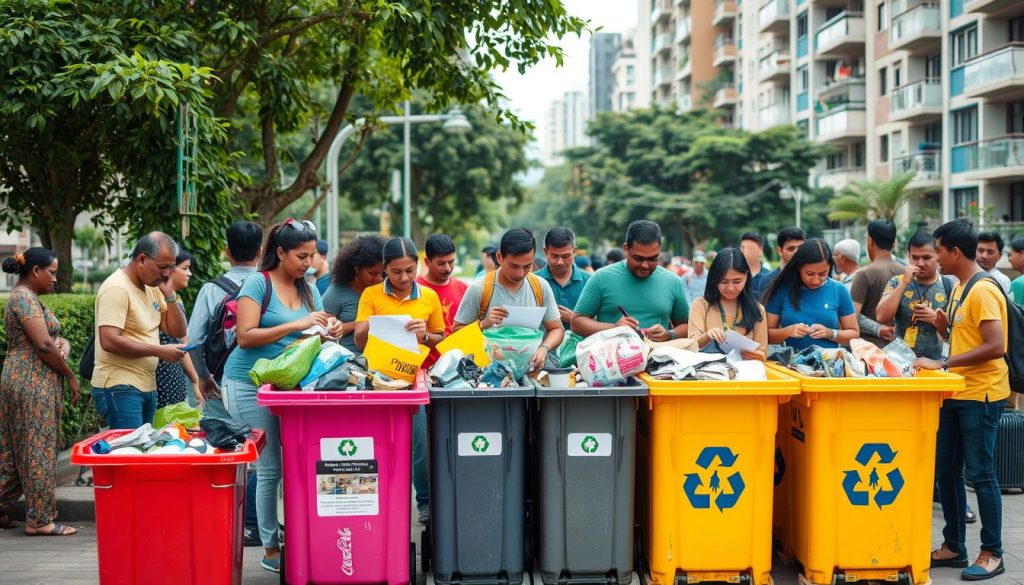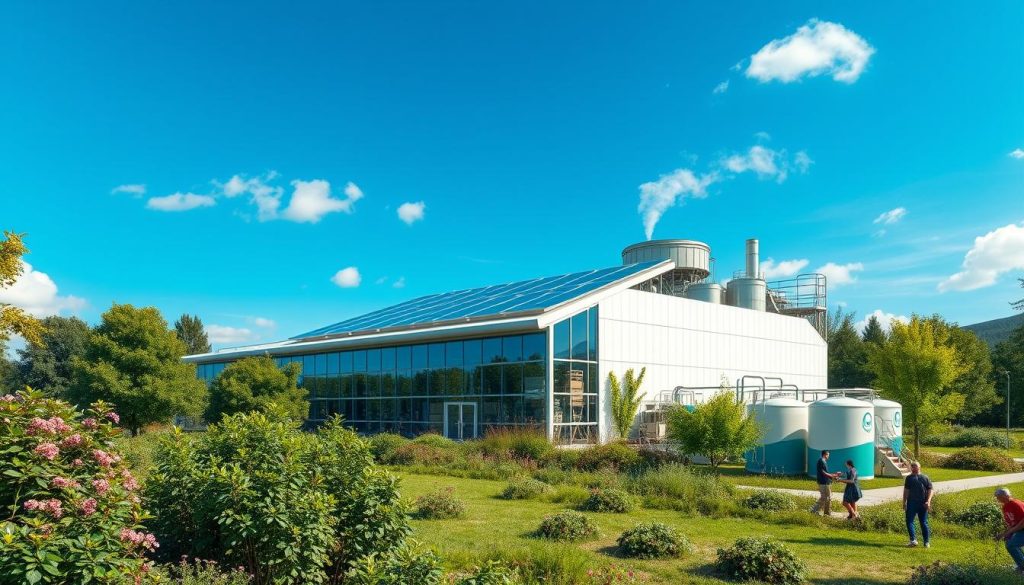As a concerned citizen, I invite you to join the movement for transformative waste management reforms. Environmental sustainability is a pressing issue, and it’s time for action. By advocating for better waste disposal, we can create a greener future for our communities.
The current waste management in the United States is concerning. Misconceptions and outdated systems are major challenges. But, through advocacy and community engagement, we can drive change. Your voice and involvement can significantly impact sustainable solutions.
In this article, we’ll look at the pressing issues in waste management, the role of advocacy, and how you can get involved. Together, we can raise awareness, work with local governments, and implement innovative strategies. Let’s build a cleaner, greener tomorrow. Join me in this crucial cause.
Understanding Waste Management Challenges
Waste management is a big issue that affects our communities and the environment. We face big challenges in managing the growing amount of waste each year. Knowing where we stand with waste management in the U.S. is key to solving these problems and finding sustainable ways to handle waste.
The Current State of Waste Management in the U.S.
The United States produces over 292 million tons of municipal solid waste every year. Most of this waste goes to landfills. Despite efforts to reduce landfill use and promote zero waste, a lot of waste still isn’t recycled or diverted from landfills.
Common Misconceptions about Waste Disposal
- Myth: All recyclable materials are actually recycled. In reality, only about 32% of municipal solid waste is recycled or composted, leaving a significant portion of recyclables ending up in landfills.
- Myth: Landfills are a safe and environmentally-friendly way to dispose of waste. Landfills can release harmful greenhouse gases and leachate, which can contaminate soil and water sources.
- Myth: Incineration is a clean and efficient way to manage waste. While incineration can reduce the volume of waste, it can also release harmful air pollutants and contribute to air quality issues.
By understanding the current challenges and misconceptions surrounding waste management, we can work towards developing more effective and sustainable solutions that prioritize landfill reduction and the implementation of zero waste policies.
The Importance of Advocacy in Waste Management

Advocacy is key in finding sustainable ways to manage waste. It involves working with the community and local leaders. This helps push for laws that improve how we handle waste and recycling.
This teamwork not only makes people more aware of the issue. It also leads to real, lasting changes.
Why Advocacy Matters for Sustainable Solutions
Advocacy helps shape policies and gets funding for new waste management ideas. Advocates work hard to get leaders to focus on the environment. They push for laws that help our planet and reduce waste.
The Role of Community Engagement
Getting people involved is at the heart of good advocacy. Advocacy groups work with locals to build a united front. Together, they aim for a cleaner, greener future.
Through workshops and cleanups, they teach and inspire. This helps communities take charge of their waste. It leads to changes in behavior and laws.
Advocacy connects public concerns with action in government. It amplifies the voices of citizens and encourages community-led solutions. This way, advocates can bring about real, lasting changes in waste management. It benefits the environment and improves life for everyone.
My Personal Journey in Waste Management Advocacy

My journey in waste management advocacy started a few years ago. I began volunteering at a local recycling center. Seeing the challenges of recycling made me realize how important it is to change our waste systems.
Learning about the circular economy showed me its power to solve the global waste crisis. I knew I had to help make a difference.
How I Became Involved in the Cause
It began with joining a community clean-up event. Picking up trash and sorting recyclables was a humbling experience. It showed me the big problem of waste in our area.
After that, I got more involved in recycling efforts. I went to city council meetings and pushed for better waste management policies.
Key Experiences that Shaped My Perspective
- Volunteering at a local recycling center and witnessing the challenges faced by the facility
- Participating in community clean-up events and seeing the extent of litter and waste in our neighborhoods
- Attending city council meetings and advocating for the implementation of a curbside composting program
- Learning about the concept of a circular economy and how it can transform the way we approach waste management
These experiences have deeply shaped my view on waste management advocacy. I’ve learned that change needs everyone’s effort. I’m dedicated to helping find sustainable solutions for our community and the environment.
Effective Strategies for Waste Management Reform

To really change waste management, we need many approaches. This includes local efforts and working with governments. These strategies help us move towards using waste for energy and keeping our environment clean.
Grassroots Initiatives that Work
Local movements can make a big difference. They help by getting people involved and teaching them about waste. Good grassroots efforts include:
- Organizing community cleanups and recycling drives
- Hosting educational workshops on waste reduction and recycling
- Advocating for policy changes at the municipal level
- Partnering with schools and youth organizations to instill environmental values
Collaborating with Local Governments
Working with local governments is key for lasting change. It helps us tackle waste problems in our areas. Together, we can make policies, build energy systems, and adopt green practices.
Combining local efforts with government partnerships creates a strong force for change. This helps us move towards a better waste management system.
Success Stories in Waste Management Advocacy
In the United States, many communities have made big steps in waste management. They’ve started zero waste policies and cut down landfill waste a lot. These stories are great examples for others wanting to make a difference in their area.
Case Studies of Successful Reforms
San Francisco is a great example. It has reached an 80% landfill diversion rate with its zero waste program. The city’s strong recycling and composting efforts have set a high standard for other cities.
Oregon is another success story. Its “Zero Waste 2020” initiative has greatly reduced landfill waste. Oregon worked together with state agencies, local governments, and groups to create policies and incentives for sustainable waste practices.
Lessons Learned from Other States
- It’s important to talk to people and get them involved in zero waste policies.
- Good recycling and composting programs, along with education, can really cut down landfill waste.
- Working together between state and local governments and community groups is key to successful waste reforms.
These examples show how advocacy can lead to big changes in waste management. By learning from these successes, we can keep moving towards a zero-waste future.
How to Get Involved in Advocacy Efforts
Waste management reform is a big issue that needs our help. We all can play a part in making a difference. If you want to help, there are many ways to do so.
Volunteer Opportunities Available
Local groups working on waste reform need volunteers. You can reach out to environmental groups or your city’s recycling department. They might have jobs for you, like helping with clean-ups or teaching people about recycling.
Joining Local Advocacy Groups
Joining a local group focused on waste reform is another great way to help. These groups let people come together to make changes. You can meet others who care about the same things and work together.
Helping with public awareness campaigns is also key. By sharing info, you can help your community make better choices. This supports sustainable living.
Every little bit you do helps in changing our waste systems. You can volunteer, join a group, or just spread the word. Your efforts can inspire others to help too. Together, we can make a better future.
Raising Awareness through Education
We believe in teaching our communities about waste management. This knowledge helps drive change towards a sustainable future. By sharing our knowledge, we encourage people to recycle and care for the environment.
Sharing Knowledge with the Community
Teaching through workshops and materials is key to awareness. Hands-on lessons and simple guides make complex topics easy to understand. This motivates people to act.
We teach how to recycle and the effects of our choices. Working with schools and community groups helps spread our message. This way, we reach many people.
Impact of Educational Workshops
Our workshops have made a big difference. Recycling rates have gone up, and people are more aware of the environment. They feel more responsible and want to live greener.
By teaching people, we spark change now and for the future. We’re excited to reach more and make a bigger impact on our planet.
The Future of Waste Management Reform
The future of waste management is changing fast. We’re moving toward a circular economy where waste is reduced and resources are reused. New technologies like advanced recycling and waste-to-energy are leading the way to a greener future.
Trends and Innovations on the Horizon
New laws are coming to tackle the waste problem. Extended producer responsibility makes companies responsible for their products’ life cycle. Recycling and diversion goals are also getting bigger in the U.S. These changes, along with eco-friendly products and circular economy models, promise a better future for waste management.
How We Can Make a Lasting Impact Together
We can make a big difference by working together. By supporting new solutions and pushing for change, we can improve waste management. Community efforts and working with local governments can help bring these innovations to life. Together, we can turn waste into something valuable for future generations.

